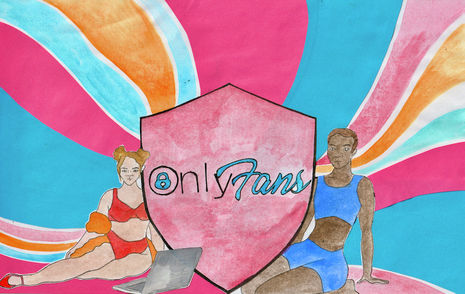Violence and betrayal: the war on sex work
In the wake of OnlyFans’ ban and U-turn of sexually explicit content, Nora Redmond explores the spectrum of attitudes towards the sex industry, advocating for body positivity and safe working environments for sex workers

Content Note: This article contains detailed discussion of sexual violence, and brief discussion of racism and transphobia.
OnlyFans announced its plan to ban all sexually explicit content from its website from 1st October. The decision came following news from Mastercard that all adult content purchased through their network must be monitored, with illegal or exploitative material being removed. The announcement was met with outrage. OnlyFans then decided six days later to take a U-turn, confirming that the policy change would be “suspended”. This series of bans and U-turns is merely one part of the right-wing battle against sex workers. The end-goal is to limit their rights, and to rewind years of progress made to recognise sex work as work. With a risk to the entire virtual sex industry, many will have to abandon remote work to engage in direct physical contact. This will only lead to workers becoming more vulnerable to violence. Above all, the safety of sex workers must be prioritised.
“The company abandoned [workers] at the first sign of a financial threat”
Sex workers have made OnlyFans the billion dollar company it is today, with a net revenue of $2.5 billion expected in 2022. The vast majority of the service’s most successful creators are producing porn. Yet many OnlyFans workers will not return to the platform since the ban and U-turn. The company abandoned those which were so pivotal to its major growth at the first sign of a financial threat. As argued by one Twitter user and OnlyFans creator, their “hard work” was taken by the corporation to build its “notoriety” only for those responsible to be betrayed. She advises creators to seriously reconsider turning back to the business.
OnlyFans has fundamentally failed its workers. The push by Mastercard came from a campaign against all forms of pornography by Exodus Cry and the National Center on Sexual Exploitation. While it may appear at first that Exodus Cry is only advocating for tackling sex trafficking, the Christian non-profit organisation in fact supports the abolition of the legal sex industry. The group has had immense lobbying power, leading MasterCard and Visa to stop processing all payments spent on pornographic content on Pornhub. In short, after years of progress, the sex industry is moving backwards in steps. Criminalising sex work brings with it its further stigmatisation. When consensual sex work is not accepted by society, a sexist culture is perpetuated as bodily autonomy is restricted by the state.
Republican politicians and Christian lobbyist groups have been successful in their crackdown on the legal online sex trade. Signed by Trump in 2018, FOSTA-SESTA were passed to supposedly tackle sex trafficking. However, the bills are curbing the virtual sex industry, making it increasingly difficult for sex workers to continue their services. Reddit, Craigslist, and Google have already been impacted by the controversial legislation which seeks to censor material. These moves are part of a mission to control the bodies of sex workers — who are predominantly women. Consent is key in this controversy. The consensual online pornographic world not only improves the authority and safety of sex workers, it also has the potential to encourage body confidence and autonomy. Sex work helps to reclaim the body for what it is supposed to be — controlled by its owner. By considering sex workers only as victims or criminals, it is forgotten that producing pornographic material can be liberating and empowering for the creator.
“Criminalising the sex trade only pushes the industry underground [...] here, the practice goes unregulated, violence is normalised, and workers are unsafe”
As a subscriber-only website, OnlyFans provides a safe, remote space for sex workers to earn a living. It allows for creators to choose their audiences and have significant financial freedom; workers keep 80% of the earnings generated from their content. This agency is especially significant in the context of a global pandemic. Following sudden unemployment, many were drawn to the website to produce adult entertainment. The number of creators grew from 450,000 in the spring of 2020 to over double that by March 2021. OnlyFans offers a service which can generate high profits for creators fast. The move to ban pornographic content from the internet does little to nothing to protect the workers who need this service the most. Those who have come to rely on the website as their sole source of income are the ones who are the most at risk of danger. For them, street-based prostitution may be the only alternative. Such circumstances would be disastrous for those of marginalised backgrounds. In 2015, 41 sex workers were murdered in the United States, of those, 17 were Black and 12 were transgender women. Women of colour and transgender people involved in the sex industry are extremely vulnerable to sexual violence. Criminalising the sex trade only pushes the industry underground; here, the practice goes unregulated, violence is normalised, and ultimately, workers are unsafe.
In the end, OnlyFans’ panicked decision to block all footage of a pornographic nature indicates how low the welfare of its workers is in its priorities. The move signalled ignorance towards the integrity of OnlyFans creators who champion bodily autonomy in a safe environment. There is a myriad of data to suggest that online sex work is safer than physical work. The internet allows for sex workers to screen their clients, avoid potential violence, and obtain financial freedom. OnlyFans must commit to creating a safer platform for all by self-regulating instead of announcing an outright ban. This could include introducing more stringent age verification measures by demanding the ages of all people present in videos, as opposed to only checking the identification of the account holder.
The war on sex work is unceasing. Attempts to deplatform explicit content creators and destroy their virtual safe spaces will only result in an increased threat to violence. As with any other legal profession, sex workers have a basic right to personal autonomy and protection.
 News / SU stops offering student discounts8 January 2026
News / SU stops offering student discounts8 January 2026 News / Uni-linked firms rank among Cambridgeshire’s largest7 January 2026
News / Uni-linked firms rank among Cambridgeshire’s largest7 January 2026 Comment / Plastic pubs: the problem with Cambridge alehouses 5 January 2026
Comment / Plastic pubs: the problem with Cambridge alehouses 5 January 2026 News / New movement ‘Cambridge is Chopped’ launched to fight against hate crime7 January 2026
News / New movement ‘Cambridge is Chopped’ launched to fight against hate crime7 January 2026 Comment / What happened to men at Cambridge?31 December 2025
Comment / What happened to men at Cambridge?31 December 2025










